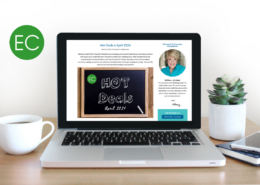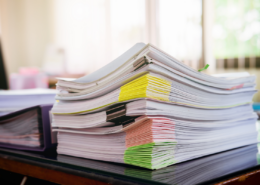Mistakes Teach Us What Doesn’t Work
Have you made any mistakes lately? Want to talk about it? Most people don’t. Can’t say that I blame them. It’s embarrassing. And when it’s a really dumb mistake, well that’s something you hope to never have to think about again. And that’s a mistake.
Mistakes are useful because they teach us what doesn’t work. But making the same mistake over and over again while expecting different results—well, that’s one definition of insanity. There’s tremendous value in learning from our mistakes.
I’ve accumulated a list of mistakes over many years. It’s like a trophy now—a specific compilation of things that I do not have to do again because I’ve proven they do not work.
Walking into a supermarket without a plan
Walking into the grocery store (or Costco) without a plan—a written list and cash—is a terrible mistake. I know me. Without a conscious decision to stick to it, I am a $200 mistake just waiting to happen. And if I’m really hungry? Make that $300.
Buying extended warranties on appliances
Statistically, if an appliance is going to fail it will do so in the first 90 days (the product comes with a warranty to cover this time frame) or after five years (extended warranties aren’t that extended). It’s a good exercise to figure out the total cost of an extended warranty, then consider forgoing it in favor of putting that same amount into your savings account instead of the insurer’s pocket. Chances are very good that at the end of the period warranty period, you’ll have a working appliance and a nice nest egg for yourself. For the record, a laptop computer is my personal exception to this mistake. Laptops fail routinely, trust me.
Leasing a car
And it really doesn’t work to roll the shortfall and extra charges at the end of one auto lease into a new auto lease. To have repeated this mistake over and again for no fewer than 22 years straight (yes, me in my dark financial past) was to come dangerously close to insanity.
Buying a 7,000-gallon blow-up swimming pool
Actually, I didn’t know such a thing existed so I can’t even argue it was something we needed. Standing there in the middle of the Home Show I managed to pull off the impulse purchase of the century (thankfully, this was in the last century). That was a mistake that just kept on giving lessons to be learned until the day several years later we begged Goodwill to just take it away. Please.
Carrying more than $100 cash
Carrying a single $100 bill I keep tucked into a secret place in my wallet is for me a great deterrent for overspending. I don’t feel broke, but it’s a bill I hate to break. It is also the tipping point. Carrying around more than $100 (unless it is for a specific and immediate purchase) creates a feeling of excess that burns a hole in my wallet. The overage simply disappears. That’s a lesson I needed to learn and re-learn. Oh, the insanity.
Paying for Christmas with credit
When it comes to mistakes, depending on credit to bridge the gap between what you earn and what you spend is a big one. Debt is a terrible liar, insisting that while you don’t have the money today, you’ll have it next month. Or the next. Debt keeps you stuck in the past, always stealing from the future.
Regularly eating in restaurants
Great fortunes are often lost one dollar at a time. It may not seem like a big deal when you pick up that double cappuccino, grab breakfast on your way into the office, or eat dinner out because you’ve had (another) busy day but every little item adds up. Just $25 per week spent on fast food costs you $1,300 per year, which could go to building your emergency fund, beating down your student loan debt, an extra mortgage payment, or a number of extra car payments.
Using home equity like a piggy bank
Your home is your castle. Refinancing and taking cash out means giving away ownership to someone else. It also costs you thousands of dollars in interest and fees. Smart homeowners build equity so they don’t end up making in perpetuity. The goal is to reach 100% equity—you own it free and clear! If you keep spending the equity through home equity loans (HEL) or home equity lines of credit (HELOC) you’ll never get there, you’ll end up paying way more for your home than it’s worth, which all but guarantees you won’t come out on top when you decide to sell.
My husband and I spent years seeing our home’s meager equity as some kind of ATM. But we learned from that mistake. After years of hard work plus and benefiting from home appreciation we own our home free and clear—no mortgage ever again.
Living paycheck to paycheck
We hear it a lot, “paycheck to paycheck” but what does it mean really? I’ll tell you: Living with no cushion, no savings account, no budget, and no plan—getting paid on Friday, seeing it all but gone by Monday, then white-knuckling by living on credit cards and avoiding creditors until Friday when you get paid and it starts all over again. It’s an awful way to live.
Using retirement savings to pay off debt
You may be thinking that if your debt is costing 19% and your retirement account is making 7%, swapping the retirement for the debt means you will be pocketing the difference. But it’s not that simple. In addition to losing the power of compounding, it’s very hard to pay back those retirement funds, and you could be hit with hefty fees. With the right mindset, borrowing from your retirement account can be a viable option, but even the most disciplined borrowers have a tough time coming up with the money to rebuild these accounts. When the debt gets paid off, the urgency to pay it back usually goes away. It will be very tempting to continue spending at the same pace, which means you’ll fall back into debt again, needing to borrow yet again from that 401(k) to get caught up, and on and on it goes. If you are going to pay off debt with savings, you have to live like you still have a debt to pay—but now it’s to your retirement fund.
Debt is reversible, thankfully—provided you don’t do it over and over expecting that eventually, somehow you will get different results.
That would be insane.
Question: What was the best lesson you ever learned from a financial mistake? If you feel comfortable, share it in the comments area below.















We wanted to help our son get out of debt. What a mistake that was! We ended up losing so much of our savings and we were never repaid. Thankfully he moved away and is living on his own. He hasn’t called or requested money since he moved. It’s time he learns we are not an ATM machine.
My biggest lesson was learning the importance of the size of the Emergency Fund. Murphy’s law kicked our butt. The next thing we knew we were $20 K in credit card debt.
Thank goodness we learned our lesson and received instruction from Mary Hunt and Dave Ramsey. God is good…
not knowing enough about 401(k) is almost a death sentence financially. The main reason? Deferred income in the 70s only means that when you take any money out you are taking it out with tax rates in the current year. . FATAL !
Ext Warranties: Over 20 years I have tried to understand why people would take out a warranty on an appliance or any other thing. It seems to me that if I did so I would be ensuring that the manufacturer knows that he’s putting forth a product that won’t last a long time. Why should I pay for a manufacturer who does not guarantee his own product? To me it’s just foolishness
Putting all my eggs in one basket and not listening to my financial adviser. Then to make it worse when the technology sector crashed I told him to pull it out instead of leaving it to let it grow back, and then some, and just putting new finds into other sectors.
My worst mistake was ever having a credit card. So much heartache resulted from that one decision. I wish that I’d never heard those two words.
Suzanne, I’m right there with you. I no longer have a credit card, and never want one again.
Thank you, Mary, for some very valuable wisdom. I appreciate how you recount your own mistakes and how you learned from them. That kind of honesty really drives the point home about financial lessons.
Well said!!!!
After a lot of watching of human nature – and a lot of other foolish things – I slowly realized that humans weren’t ever meant to be “perfect”. We were always intended to make some required minimum percentage of mistakes. Some of us have a higher minimum percentage than others, and there isn’t any “extra credit” for having made a really stupid or serious mistake.
But, thanks for the heads up call on these few possibilities. Hopefully, your warning will narrow our field of potential boo boos?
Yeah, right!
Jack
Such a good list of avoidable mistakes. I can relate to the inflatable pool as I and my husband bought a big ticket backyard item and just knew we would use it a lot. We were wrong. By the time we finally got it put together and used it we found we weren’t that impressed with the process. We could of saved a lot of money and time by doing some research to see if the item really would fit our lifestyle. Lesson learned. Thanks Mary!
This is what I’ve learned: Just because you ask the right questions, doesn’t mean you’re going to get the right answers, Question everything. This wisdom just saved us from making a big, big mistake regarding solar panels.
DONOT co-sign for ANYTHING OR ANYONE. Person was paying, then lost his job……………..guess what? I had to pay off the debt. So I repeat DONOT co-sign for ANYTHING OR ANYONE. Hard lesson learned.
So true.